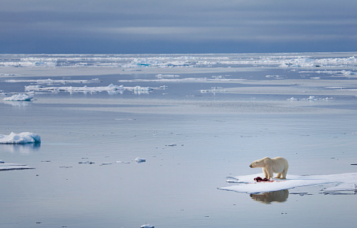Five hundred and eighty-five BC marks the sixth year of a vengeful war waged between the Medians and the Lydians in Anatolia — modern-day Turkey. The conflict was catalyzed by a cruel culinary prank — a small band of scorned hunters butchered a Median Prince and fed him to his father, the king. A prolonged, savage struggle ensued, marked by atrocities on both sides. Tens of thousands of Medians and Lydians were clustered near the Halys River, lopping off each other’s heads and limbs, when suddenly — the sun was extinguished. Gone. A unifying wave of terror washed over the combatants, and they cautiously retreated to their respective camps in awe. Generals representing each nation quickly met, sliced their forearms and sucked each other’s blood in a ceremonious declaration of peace. This battle is known as the Eclipse of Thales.
Though much has changed since 585 BC, the unifying nature of a common threat, especially an otherworldly one, is no less powerful today than it was then. History has taught us, time and again, that the more perilous an enemy is perceived to be, the more persuasive the prospect of peace appears. Thus, we are fortunate, in a sense, that in 2015 every nation on Earth shares what is, perhaps, the most compelling common enemy humankind has ever encountered.
Despite recent terrorist attacks on Paris, the city is poised to host world leaders as they attempt to marshal against a common enemy that makes ISIS look like Dennis the Menace. From Nov. 30 to Dec. 11, over 120 nations will participate in the 21st Meeting of the States Parties to the UN Framework Convention on Climate Change (UNFCCC). The goal of the convention is to devise international agreements that will significantly reduce global greenhouse gas emissions and signify a collective commitment to combat human-caused climate change.
While it’s true that climate change isn’t as evident to world leaders today as the onset of darkness was to those ancient warriors, the perils it poses are far more malevolent. As the Earth’s average global temperature continues to rise at a historically unprecedented rate, we will pay witness to the slow, violent warping of our world. An anomalous build-up of atmospheric CO2 will fuel more devastating droughts, like the one which rocked Syria from 2006 to 2011 and catalyzed the desperate, mass migration that plagues our international community today.
When world leaders convene at the UNFCCC in Paris, they will attempt to solidify a strategy for tackling the terror that is climate change. Many nations — including China, which has agreed to adopt a national cap and trade system — have already submitted significant emission reduction plans. The time is ripe for modern world leaders, especially those representing the United States, to unite against a common enemy that no individual sovereign can defeat on its own, and which threatens to conquer all alike. Ironically, too many of our U.S. leaders fail to acknowledge the terrifying threats of climate change and are thus unwilling to make the economic and political sacrifices necessary to effectively combat it. I pray their ignorance will not bring ruin to this year’s UNFCCC, as it has in years past. I will leave you with another historical parallel, which should offer insight into the hazards of inaction against this seemingly supernatural common adversary.
In 1239, Hungary received an influx of migrant, mostly tribal people from the East, called the Cumans. The Cumans brought warning of a hellish horde of Steppe warriors called the Mongols. King Bela IV of Hungary viewed the Cumans’ warning with opportunism rather than fear. Instead of marshalling his own forces, to combat the forewarned Mongol invasion, Bela relished in the defeat of his kingdom’s long-time adversaries, and remained skeptical of the imminent threat. The consequences of Bela’s hesitation were utterly devastating to the people of Hungary, and of Eastern Europe as a whole. By 1242 the region suffered massive depopulation and severe trauma by the merciless Mongolian horde.
It seems that modern world leaders, confronted with the threat of an ungodly, undiscriminating peril, would be wise to follow the peace-breaching example set by generals at the Eclipse of Thales, rather than the arrogant, self-serving approach opted for by King Bela of Hungary when he first learned of the Mongolian menace. I expect they will, and I anticipate Paris will serve as a modern-day Halys River — a site where unifying, international peace will be brokered under the threat of an extra-national enemy.


